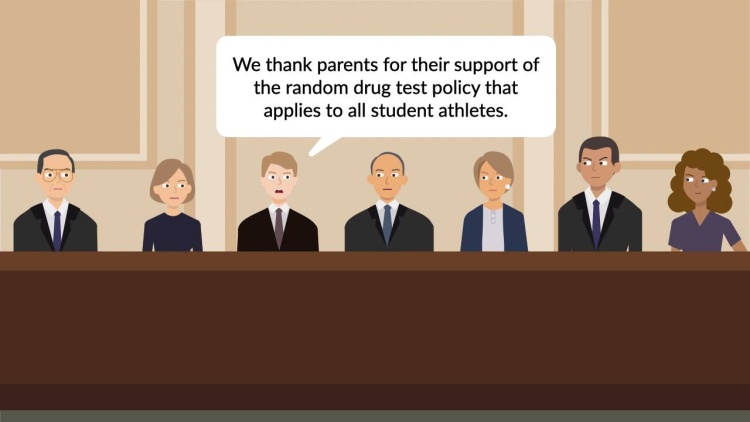Vernonia School Dist. 47J v. Acton
United States Supreme Court
515 U.S. 646 (1995)
- Written by DeAnna Swearingen, LLM
Facts
In response to increases in drug use and disciplinary problems amongst the student population, Vernonia School District 47J (District) (defendant) implemented a drug testing policy. The purpose of the policy is to protect the health and safety of student athletes, because drug usage makes sports-related injuries more likely. Students participating in sports and their parents must consent to testing. All student athletes are tested at the beginning of the season and students are selected at random for additional testing each week. The test requires students to produce a urine sample while being monitored (from outside the stall for girls and from 12 feet away for boys). Students that test positive are placed in a drug assistance program or suspended from sports. Strict procedures are followed to maintain confidentiality, and the records are not turned over to police. James Acton (plaintiff) was not permitted to play football because his parents (plaintiffs) did not consent to drug testing. The plaintiffs filed suit and requested declaratory and injunctive relief barring enforcement of the policy. The United States Supreme Court granted certiorari to consider whether the policy violated the United States Constitution.
Rule of Law
Issue
Holding and Reasoning (Scalia, J.)
Dissent (O’Connor, J.)
What to do next…
Here's why 907,000 law students have relied on our case briefs:
- Written by law professors and practitioners, not other law students. 47,100 briefs, keyed to 996 casebooks. Top-notch customer support.
- The right amount of information, includes the facts, issues, rule of law, holding and reasoning, and any concurrences and dissents.
- Access in your classes, works on your mobile and tablet. Massive library of related video lessons and high quality multiple-choice questions.
- Easy to use, uniform format for every case brief. Written in plain English, not in legalese. Our briefs summarize and simplify; they don’t just repeat the court’s language.





